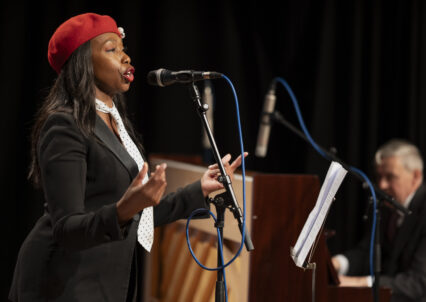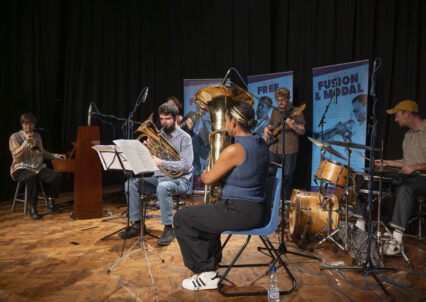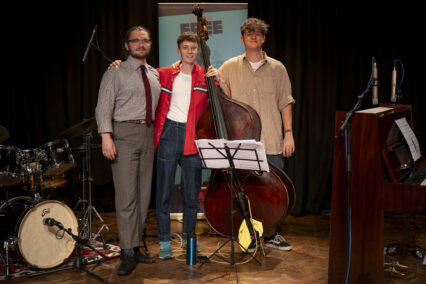Not even Covid lockdown could silence the annual Wall2Wall Jazz Festival in Abergavenny – it made videos of the music for streaming – and it has continued since to re-establish its loyal ‘live’ following. This year’s event was typical. Nigel Jarrett and Ian Mann report
Home is where the heart is and there’s a lot of heart in young pianist Eddie Gripper’s début album of the same name. It’s all happening for the 23-year-old graduate of Cardiff University: not only the release of an impressive piano trio album, but a rewarding appearance of the trio at Pizza Express and a nationwide tour in the offing. A composer of refreshing originality but with roots deeply embedded in the post-modern jazz piano tradition, he was the right choice to open Black Mountain Jazz’s Wall2Wall festival this year, making the Welsh connection at a club where he was spotted early by its punters as one to watch.

The trio’s bassist was Ursula Harrison, daughter of Paula Gardiner, who founded the jazz course at the Royal Welsh College of Music and Drama in Cardiff and its drummer was Patrick Barrett-Donlon – the same line-up which launched the album at Pizza Express, though the bassist on the recording is Isaac Zuckerman.
To be honest, and on Gripper’s own admission, the festival appearance evinced a strong element of Yin and Yang, in that opposite but interconnected forces were at play. Much of Gripper’s inter-chart reflections pointed to compositions of autobiographical charm involving grief, solitude, and that crossroads uncertainty of a young musician starting out on his career. Everything, in fact, that was happening in his life in a relatively short period. That was the Yin. The outgoing, carefree Yang incorporated songs by Keith Jarrett (Country), Chick Corea (La Fiesta), Cedar Walton (Martha’s Prize) Spherical (Michael Brecker), and Paul Simon (Still Crazy After All These Years). The album, of course, is entirely Yin.
But attention was focused as much on how all these charts were conceived as trio performances as on the nature of the tunes themselves, whose essence was often easy for Harrison to latch on to after Gripper had explored their wide dynamic range (always a give-away in a classically-trained pianist). Country was almost a duet sprinkled as with gold dust by Barrett-Donlon’s spellbinding contributions with brushes and cymbals. For a drummer with a potentially explosive armoury, he is spare but telling. He’s a pointillist at the kit.The Gripper original Before The Storm had a few quirky and prescient sforzandi prior to the heavens opening. To The Moon was a Gripper solo and Lament a duo with Harrison.
From a musician starting out big time to one, trumpeter-composer Laura Jurd, who’s made it. She brought along a sextet to play charts from her much-lauded The Big Friendly Album (2022). With herself on trumpet and at the piano, there was guitarist James Kitchman, electric-bass Toby Yapp, Cameron Scott on euphonium, Hanna Mbuya on tuba and Corrie Dick at the kit. The album line-up is Jurd, Dick, Martin Lee Thomson (euph), Danielle Price (tuba), Alex Haines (g), Ruth Goller (b), plus guests. The festival appearance was thus an opportunity to play that bit longer – Little Opener was almost twenty minutes – but without the significant contribution on four of the album’s nine tracks of accordionist Frode Haltli.

Jurd might be described as a trumpeter at the piano, sometimes – on Sleepless, for instance – picking out with her left hand at the keyboard the rudiments of a chart while sketching it on trumpet with her right before sallying forth in full lyrical blast.
The instrumentation of the sextet was interesting, given that on the album the guests add extra colour – variously flute, accordion, soprano sax, violin – and reduces the feeling that this is a brass sextet without, as it were, the means of cooling it. The background bass riff of Mosky, from Jurd’s Dinosaur days, was characteristic of the night, with Scott’s blistering solo not the kind of effusion one usually gets from that instrument, at least in a jazz context. Mbuya’s tuba, was more typical, reinforcing Yapp’s bass or in duo with Scott, but never taking a solo – not that with Jurd at the helm it wouldn’t be worth attempting. Attracting non-solo attention too was Kitchman, who gave a quiet master-class in what the electric guitar can get up to in that beguiling territory between background and foreground. His solo on Fuzzy, the jaunty first chart of TBFA that Jurd wrote was not the explosive rock eruption one might have expected, underlining how much of the musical textures of this group are one of a piece.
Jurd’s writing and its instrumental transmutation evokes – with just brass especially – an upbeat and positive atmosphere redolent of New Orleans carnival and folk traditions and if ever that were in doubt or about to segue into something less jovial and celebratory, there was always Corrie Dick’s drumming to keep the feeling on track by simmering always in the background and ever ready to boil. That it could segue into the lyrical was a given. The overall feeling evoked, of course, was Jurd’s originality.
After years as a backing singer (Simply Red, Stevie Wonder, Roxy Music, etc), Sarah Brown crashed into the jazz charts with a superb album dedicated to the music of Gospel singer Mahalia Jackson. Tunes from the album formed the core of her appearanmce on the festival’s final night, though with piano accompaniment (Colin Good) and not the rest of the band which joins her on the album.
Brown told BMJ’s Debs Hancock in an interview that a difficult childhood encouraged her to seek solace by singing at her local Pentecostal church, where she also began to absorb the musical influence of another great Gospel singer, Sister Rosetta Tharpe. Brown became one of the lead vocalists in the Inspirational Choir, the first gospel ensemble to be signed to a major record label (CBS).

The duo began with the spiritual Nobody Knows. Brown’s voice – rich, powerful, emotive and compassionate – is a formidable instrument and it was easy to see why she has been in such great demand. Good’s playing was understated and flawless.
Take My Hand, Precious Lord was a favourite of Martin Luther King and was played at his funeral. Brown encouraged the audience to sing along with Joshua, something it did readily and joyously. Elsewhere, she charmed it with her dancing as Good delivered a series of instrumental solos. I’m On My Way was a rhumba-style arrangement, with Brown praising the percussive nature of Good’s playing. “Colin doesn’t need a drum”, she said. Brown first recorded the hymn His Eye Is On The Sparrow in 2006 but lacked the confidence to release it. She has since restored the piece to her repertoire in an arrangement that presents the song at both slow and fast tempo.
The reception from a full house was ecstatic, and the duo remained on stage to encore with Amazing Grace, famously performed by Jackson at the 1958 Newport Jazz Festival. .
Other events during the three-day festival included the Abergavenny Sax Quartet, Youth Big Band, tango and Gospel singing workshops, jazz-orientated craft activities, jazz videos, and a Poetry & Jazz gig with poets Ric Hool, Lyndon Davies and Graham Hartill and the BMJ Collective. Veteran jazz broadcaster John Hellings was also interviewed by Hancock. Hellings was active in local radio and admitted coming to jazz as a rebellious teenager who wanted to listen to “something different”. One of his most important roles was in publicising those who were presenting live jazz. He recalled the days when record shops such as City Radio in Cardiff were run by knowledgeable staff who discussed and recommended music.
Photo credit: All pictures by Kasia Ociepa



 Enjoyed this article? Support our writers directly by buying them a coffee and clicking this link.
Enjoyed this article? Support our writers directly by buying them a coffee and clicking this link.








